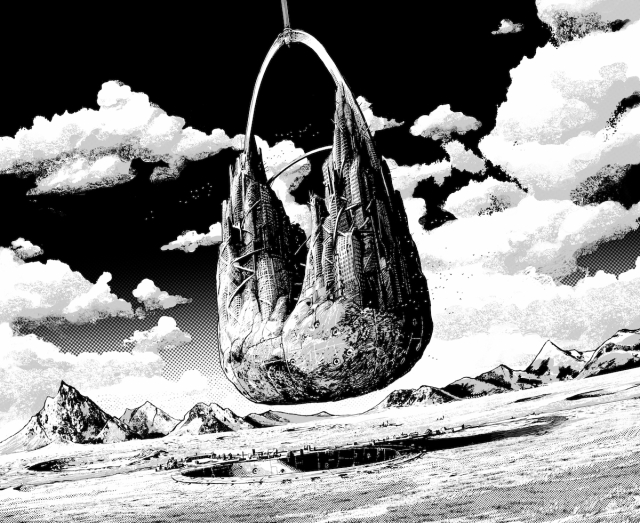The moon blew up without warning and for no apparent reason.
That’s a killer opening line. And not one that Stephenson ever explains. This isn’t a book about why the Moon blew up; it’s a book about what humanity decides to do about it. Not that they aren’t interested in the reason (if you want to know my theory go read The Dark Forest), but they very soon have much larger problems on their hands.
Seveneves is hard science fiction at its best. Stephenson takes a precipitating event—the Moon blowing up—and runs with it, throwing every bit of science along the way he can fit. And, unlike the Moon detonation, he explains each. At length. At such great length, in fact, and in the telling of such an epic story, that my primary criticism of Seveneves is that it might have been better suited to be a trilogy. If Epic Science Fiction wasn’t a genre, it is now.
Befitting the scale of the tale, Seveneves follows many, many characters. But the two main characters, to the extent there are any main characters, are Dinan and Doob. Dinan is the daughter of a mining magnate, doing a little proto-mining of her own on the International Space Station for a distinctly Space-X-y asteroid mining startup. Doob is sort of a non-douchey Neil deGrasse Tyson expy who serves as the face of science for the United States and is the first to notice that all of those moon shards are going to start hitting each other and breaking up further and definitely start falling to Earth. Oops.
This means that the Earth’s surface will shortly be become uninhabitable. For millennia. Doob presents two options to the President of the United States—people can get underground or they can get into space. Other than Dinan’s family, the former gets oddly ignored by the narrative, despite the fact that it avoids the rather difficult problem of escaping the Earth’s gravity and atmosphere. The solution to the latter, along with a lot of rockets, is to send representatives of each country chosen by lottery to live in arklet modules to be attached to the ISS (this may be the best approach, but they spend all of about 5 minutes deciding on it).

Seveneves is divided into three parts, each worthy enough for and almost as long as their own book. Part 1 deals with the above, largely focused on the effort to get as many people as possible into space rather than what’s happening on the ground. Part 2 deals with what happens after enough moon rocks hit the Earth so that the space humans are effectively independent. Forever. (SPOILER: things fall apart.) Part 3 opens thousands of years later when rehabitation of the Earth finally becomes viable. I won’t say much about that, because I can’t without huge spoilers, othering than that the terraforming gives Stephenson the chance to throw out one of the lamest puns in science fiction—the process is helped along by Orbital Neo-Agricultural Nacelles.
The pacing and storytelling tend to whipsaw around. In at least part that is intentional. Stephenson wants to focus on the science instead, or he doesn’t think what’s happening is that interesting, or he wants to hide the ball in furtherance of a future reveal. At least a couple times characters put together a pretty good plan, almost immediately someone important dies, and things go to shit. Because, well, that happens. It’s tough to pull off in fiction, and Stephenson doesn’t quite nail it, but when done well it can make for great fiction (see A Song of Ice and Fire).

And there is a lot of science. Asteroid mining, orbital mechanics, astrophysics, robotics, genetics, nanotech. With thousands of years to project the science, Stephenson really goes crazy in part 3. I have a limited background and somewhat limited interest in hard science, but this is worldbuilding at its finest and gives me what I’m missing in so much space opera.
Bottom line: Seveneves has pace problems and the final act is truncated to the book’s detriment, but (1) I couldn’t stop reading and (2) I couldn’t stop thinking about it.
4.5 of 5 Stars.


I have read Snowcrash, but not this one. You have encouraged me to add it to my list!
LikeLiked by 1 person
Seveneves was my first Stephenson book, but it certainly won’t be my last.
LikeLiked by 1 person
Pingback: 2016 Hugo Awards Ballot | Every Day Should Be Tuesday
Pingback: Review of Death’s End by Cixin Liu, translated by Ken Liu | Every Day Should Be Tuesday
Incredible book. I read it non-stop, fighting sleep to finish it. Yes, the third act slows down a bit, but the Big Ride rocks in the second.
LikeLiked by 1 person
Pingback: Review of Arkwright by Allen Steele | Every Day Should Be Tuesday
What a concise, well-written review of a much debated book! I think you really nailed the issue of the book’s pacing problem, and it’s great to see other folks who appreciated Stephenson’s focus on the science here.
LikeLiked by 1 person